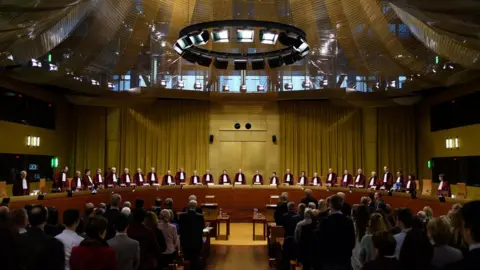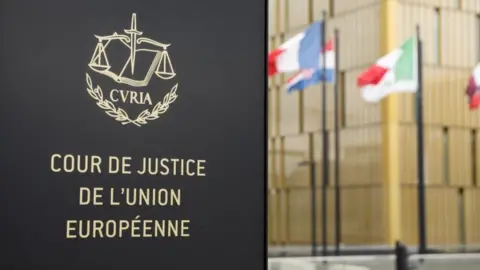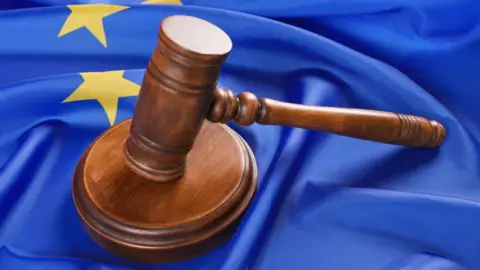Brexit court case 'could lead to disaster', EU lawyers warn
 ECJ
ECJAllowing the UK to unilaterally halt the Brexit process could lead to "disaster", judges at Europe's top court have been warned.
The European Court of Justice is deliberating on whether the UK can call off its withdrawal from the EU without permission from member states.
But lawyers acting for the EU said allowing countries to do so could create "endless uncertainty".
The case has been brought by a group of Scottish politicians who oppose Brexit.
They hope it will give clear guidance to the UK Parliament about the options open to it as MPs vote on the prime minister's Brexit deal - and that it will result in "no Brexit" being an alternative to either "no deal" or Mrs May's deal.
The UK government says it has no intention of calling off Brexit, and says the politicians bringing the case are using it as "ammunition" in their campaign to halt the withdrawal process.
The court also heard from lawyers representing the Council of the European Union and from the European Commission, who both argue that revoking Article 50 is possible - but that it would require unanimous agreement from the other 27 member states.
They are concerned that the case could set a precedent where other countries would be able to formally notify their intention to leave and then seek better terms from the remaining EU countries, before cancelling their withdrawal.

Hope and fear at the European Court of Justice
Analysis by Adam Fleming, BBC News in Luxembourg
There were two emotions on display in the ECJ's gold-encrusted courtroom: hope and fear. The UK government was worried that anything said about Brexit by European judges could be used as ammunition in the battle to bring down Theresa May's deal.
The EU fretted about Article 50 being re-written in a way that meant a country could announce it was leaving then change its mind again and again, creating a state of permanent anxiety. Or worse, using it as a tactic to secure a better deal at the EU's expense.
The campaigners who brought the case were just glad that the concept of Brexit being reversed had a very public airing so close to the vote on the deal by MPs.

Hubert Legal, the chief lawyer for the European Council, argued that allowing unilateral withdrawal could therefore lead to "disaster", of which "the main victim could be the European project altogether".
This was echoed by lawyers for the European Commission, who said states could act in an "abusive" manner by stopping and restarting the countdown clock, creating "endless uncertainty" - which the two-year time limit built into Article 50 was designed to guard against.
A four-hour hearing on Tuesday morning saw the full court of 27 judges consider the arguments in the case.
The court has said it will aim to decide "quickly" on the case, but has not yet set a date for doing so.
 Getty Images
Getty ImagesThe case is being considered against the backdrop of Prime Minister Theresa May fighting to sell her draft Brexit deal to MPs, ahead of a vote in the Commons in December.
The UK will leave the EU on 29 March under the terms of "Article 50", a two-year notification of withdrawal which MPs triggered in March last year.
The case has been brought by a cross-party group of Scottish politicians including Green MSPs Andy Wightman and Ross Greer, MEP Alyn Smith and MP Joanna Cherry of the SNP, and Labour MEPs David Martin and Catherine Stihler.
Extra option
They say it could give MPs an extra option when considering whether to approve the draft deal or not, because it could keep alive the prospect of calling off Brexit
Mr Wightman said the question was "vital", saying that "the chaos around Brexit shows no sign of being resolved" and that the UK parliament "must be fully informed of all of its options".
Aidan O'Neill QC, who is representing the Scottish politicians, told the court that European lawyers were inviting the judges to act "unconstitutionally and in contravention of the rule of law by reinterpreting the treaties".
He said: "It cannot be in the interest of the union as a whole to force a member state to leave the union against the wishes of the people.
"The union's wider interest lies with member states remaining in the EU when their peoples wish to do so."
 Getty Images
Getty ImagesThe UK government has opposed the case being heard from the outset, but failed to prevent it going before judges in Luxembourg after a series of appeals.
The UK government's position is that the court has "long refused for very good reasons" to answer hypothetical questions which could interfere with domestic politics. They argue that because "the UK does not intend to revoke its notification", the question of whether it can do so unilaterally is a hypothetical one.
Ms Cherry raised the case and the issue of revoking Article 50 with Mrs May in the Commons on Monday, prompting the prime minister to say that "it is not going to happen because it is not government policy".
Advocate General Lord Keen, who is representing the UK government, argued in court that the case was being used as "ammunition" by opponents of Brexit, and said the judges should find it inadmissable.
